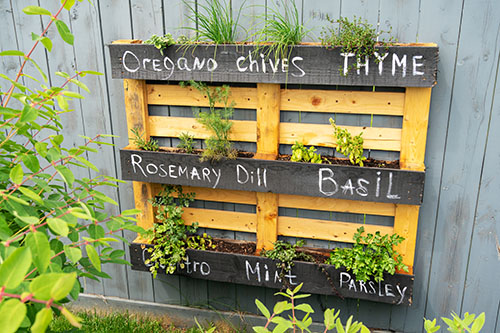Embrace the Summer with Fresh Herbs
Jun 27, 2024

Summer is a wonderful time to refresh your herb garden. With longer days and warmer temperatures, June and July are the perfect months to plant fast-growing herbs like cilantro, basil, parsley, oregano, rosemary, chives, dill, sage, and thyme. These herbs thrive in the mild temperatures and late frosts typical of Tennessee planting zones.
Let’s explore some of the best herbs to plant this summer, as well as their delightful uses.
Basil
Basil is a summer staple that’s incredibly easy to grow and very fragrant. Regularly picking the leaves encourages continuous growth throughout the season. Basil’s warm and spicy flavor enhances both sweet and savory dishes — imagine your pizzas, pasta, and soups adorned with fresh basil straight from your garden. For a refreshing twist, you can even pair basil with fresh fruit in infused water.
Chives
Chives are low-maintenance and high-yield, making them an excellent addition to any garden. These hardy plants do well in full sun and bloom beautiful purple flowers that attract pollinators. Harvesting is simple — just clip the leaves an inch or two above the soil. With a light onion flavor, chives are perfect for salads, omelets, potato salad, and compound butters.
Dill
Dill, best grown directly from seeds, is ready to harvest when it has four to five leaves. This sun-loving herb adds an aromatic touch to recipes, especially those with richer flavors. Dill is perfect for butter-based sauces, cream-based dips, and pickling projects.
Mint
Mint is a must-have for summer gardens due to its cooling and fragrant leaves. It thrives in both shade and sun. Younger leaves are more flavorful, so harvest as soon as they appear. Mint is a versatile herb, enhancing fruit salads, iced teas, roasted meats, and sauces. For a refreshing drink, add mint leaves to a pitcher of water in the fridge.
Rosemary
Rosemary loves full sun and produces lovely blue flowers, adding beauty and aroma to your garden. The best flavor comes from the younger stems, which you can snip as needed. Rosemary is ideal for marinades, roasted potatoes, and even as a garnish for charcuterie boards. Its aromatic flavor pairs well with grilled meats and vegetables.
Thyme
Thyme’s heat tolerance and love for full sun make it a top choice for summer planting. This herb also attracts bees, promoting pollination in your garden. Regularly trimming the top five to six inches of the plant will help it flourish. Thyme adds depth to savory dishes like grilled vegetables, eggs, soups, and potatoes.
Summer herb gardening is a rewarding experience, providing fresh flavors to enhance your culinary creations. By planting these fast-growing herbs, you’ll enjoy a lush and productive herb garden all summer long. Aside from herbs, you may also consider planting vegetables like kale, lettuce, peas, and radishes for a second or even third harvest.
Grab you gardening tools and get planting with Co-op! Find the nearest location here. For more content like this, check out the latest issue of The Cooperator.
Let’s explore some of the best herbs to plant this summer, as well as their delightful uses.
Basil
Basil is a summer staple that’s incredibly easy to grow and very fragrant. Regularly picking the leaves encourages continuous growth throughout the season. Basil’s warm and spicy flavor enhances both sweet and savory dishes — imagine your pizzas, pasta, and soups adorned with fresh basil straight from your garden. For a refreshing twist, you can even pair basil with fresh fruit in infused water.
Chives
Chives are low-maintenance and high-yield, making them an excellent addition to any garden. These hardy plants do well in full sun and bloom beautiful purple flowers that attract pollinators. Harvesting is simple — just clip the leaves an inch or two above the soil. With a light onion flavor, chives are perfect for salads, omelets, potato salad, and compound butters.
Dill
Dill, best grown directly from seeds, is ready to harvest when it has four to five leaves. This sun-loving herb adds an aromatic touch to recipes, especially those with richer flavors. Dill is perfect for butter-based sauces, cream-based dips, and pickling projects.
Mint
Mint is a must-have for summer gardens due to its cooling and fragrant leaves. It thrives in both shade and sun. Younger leaves are more flavorful, so harvest as soon as they appear. Mint is a versatile herb, enhancing fruit salads, iced teas, roasted meats, and sauces. For a refreshing drink, add mint leaves to a pitcher of water in the fridge.
Rosemary
Rosemary loves full sun and produces lovely blue flowers, adding beauty and aroma to your garden. The best flavor comes from the younger stems, which you can snip as needed. Rosemary is ideal for marinades, roasted potatoes, and even as a garnish for charcuterie boards. Its aromatic flavor pairs well with grilled meats and vegetables.
Thyme
Thyme’s heat tolerance and love for full sun make it a top choice for summer planting. This herb also attracts bees, promoting pollination in your garden. Regularly trimming the top five to six inches of the plant will help it flourish. Thyme adds depth to savory dishes like grilled vegetables, eggs, soups, and potatoes.
Summer herb gardening is a rewarding experience, providing fresh flavors to enhance your culinary creations. By planting these fast-growing herbs, you’ll enjoy a lush and productive herb garden all summer long. Aside from herbs, you may also consider planting vegetables like kale, lettuce, peas, and radishes for a second or even third harvest.
Grab you gardening tools and get planting with Co-op! Find the nearest location here. For more content like this, check out the latest issue of The Cooperator.